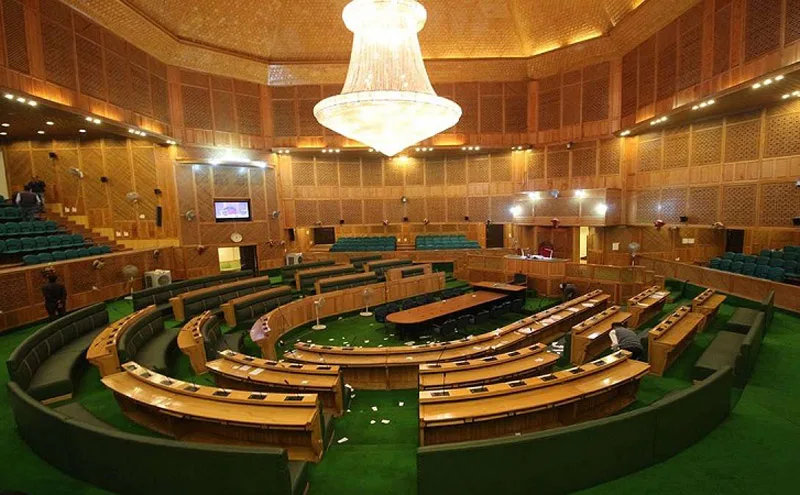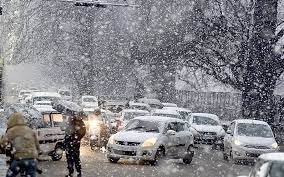A Crucial Session in a Shifting Political Landscape
By: Javid Amin | 23 October 2025
The Jammu & Kashmir Legislative Assembly opened its nine-day autumn session today in Srinagar under heavy political anticipation and media scrutiny. The session, which runs from October 23 to 31, is being widely seen as a test of strength and accountability for the Omar Abdullah-led National Conference (NC) government, barely a year into its return to power.
Even before the first day’s formal proceedings, the atmosphere was charged. Opposition benches, led by the Bharatiya Janata Party (BJP), People’s Democratic Party (PDP), and Awami Ittehad Party (AIP), have vowed to challenge the government on issues ranging from statehood restoration to youth employment and public service delivery.
Day One: Symbolism and Subtle Signaling
Traditionally, the first day of the J&K Assembly session is reserved for obituary references to departed legislators — a somber opening that sets a tone of unity before the storm of debate begins. But behind the solemnity, party strategists were already drafting motions and interventions for what many insiders are calling a “make-or-break” session for the coalition’s credibility.
Outside the Assembly complex in Srinagar’s civil lines, a modest protest by daily wage workers and unemployed youth added real-world urgency to the legislative proceedings. Their banners echoed the same demands expected to dominate the Assembly floor: “Regularisation, not rhetoric.”
Opposition Strategy: A Common Cause, Divergent Goals
Despite ideological divides, opposition parties appear united on one front — cornering the government on issues of governance, promises, and transparency.
-
BJP’s Line of Attack:
Led by Sunil Sharma, the BJP’s Leader of Opposition, the saffron party plans to highlight unfulfilled electoral promises, particularly the 200 free electricity units and 12 LPG cylinders per household that were part of the NC’s election manifesto.
Sharma has accused the government of “governing through announcements, not action,” warning that “the patience of people is running out.” -
PDP’s Focus:
PDP legislators, under Mehbooba Mufti’s guidance, intend to raise youth unemployment, human rights detentions, and the lack of institutional reform in recruitment processes. The party is also pushing for discussion on Waqf management reforms and community endowment transparency, following the rejection of its recent legislative resolution. -
AIP’s Independent Voice:
Engineer Rashid’s Awami Ittehad Party is expected to demand restoration of full statehood, a timeline for Assembly delimitation transparency, and greater accountability on land and domicile laws.
Despite different priorities, all three opposition groups see this session as an opportunity to reclaim political narrative in a region where administrative centralization since 2019 has narrowed legislative influence.
The Government’s Prepared Defense
For the ruling NC, this session is less about introducing new laws and more about defending its performance. Omar Abdullah’s administration has prepared a detailed performance whitepaper to be tabled mid-session, outlining achievements in power reforms, agricultural support, and infrastructure investment.
Senior ministers have been briefed to respond point-by-point to opposition queries, particularly on:
-
Employment creation: Around 25,000 new public sector posts were reportedly processed this year, though opposition parties contest the actual figures.
-
Power tariff reforms: Officials argue that free or subsidized power has been offset by “progressive tariff restructuring” to stabilize finances.
-
Law and order: The government will likely emphasize improved peace indices and tourism revival, projecting normalcy as a sign of governance stability.
Statehood: The Core Political Battle
The most emotionally charged topic remains the restoration of full statehood to Jammu & Kashmir — a promise repeatedly made by the Centre after the 2019 abrogation of Article 370.
Opposition benches are expected to demand a clear timeline and status report, pressing the NC-led government to formally urge New Delhi for time-bound restoration.
A BJP legislator from Jammu remarked privately, “The government cannot keep hiding behind symbolism. Either there is a statehood roadmap, or there isn’t.”
The issue resonates deeply with citizens, as statehood restoration is seen as a litmus test for political trust and autonomy in the Union Territory’s governance framework.
Reservation and Employment Debates: The Youth Factor
Another major point of contention is reservation policy — particularly around Scheduled Tribe (ST) and Other Backward Class (OBC) allocations in public employment and education. The opposition accuses the government of political manipulation in reservation distribution, while the government claims to be “balancing social justice with regional equity.”
Meanwhile, youth unemployment, currently at one of the highest rates among Indian states and UTs, will likely dominate floor discussions.
The PDP and AIP plan to move joint motions demanding a Special Employment Commission, citing delayed recruitment drives, stagnation in government hiring, and lack of private investment incentives.
Daily Wage Workers: The Human Face of Governance
Beyond political sparring, the plight of daily wage workers is expected to humanize this session’s discourse. Nearly 60,000 workers, including PHE employees, casual laborers, and contractual staff, have been seeking regularisation for over a decade.
Waheed Parra of the PDP recently criticized the “ballot-based resolution system” after his own motion on Waqf reform was rejected. He called it a sign of “legislative opacity” and “selective democracy.”
This week, the same sentiment echoes in the Assembly corridors: legislators demanding that regularisation be discussed on merit, not as a matter of political convenience.
Legislative Agenda: Key Bills on the Table
The autumn session’s legislative calendar includes two major amendment bills and several policy reviews, making it one of the most consequential sessions in recent years.
1. The Panchayati Raj (Amendment) Bill, 2025
-
Seeks to expand financial autonomy of panchayats.
-
Opposition parties are expected to demand clarity on devolution of funds and powers, arguing that local bodies remain “tokenistic.”
2. The GST (Amendment) Bill, 2025
-
Aims to align J&K’s tax code with national GST provisions while safeguarding regional trade exemptions.
-
Small traders have urged legislators to resist any move that could “erase local fiscal identity.”
3. Rajya Sabha Elections
-
The four vacant Upper House seats will be filled through legislative voting mid-session.
-
The NC–PDP rapprochement talks, already making headlines, are expected to influence how votes align.
-
BJP aims to secure at least one seat, banking on independents and smaller parties.
The Assembly as a Mirror of Kashmir’s Democracy
In many ways, this session is not just legislative — it is symbolic. It represents how democracy in Jammu & Kashmir is navigating its return to normalcy post-2019, amid competing narratives of autonomy, representation, and central control.
The Opposition sees it as a test of democratic depth, while the government views it as an affirmation of political stability. Both narratives will clash repeatedly over the next nine days, shaping not just headlines but also public perception of Kashmir’s governance trajectory.
Analyst View: A Session of Reckoning
Political observers describe this as a “session of reckoning” — a rare window where electoral promises, administrative realities, and democratic expectations intersect.
Dr. Noor Ahmad Baba, a leading political analyst, notes:
“The tone of this Assembly will determine whether regional politics in J&K can move beyond survival and rediscover a culture of accountability.”
He adds that debates on statehood and land rights could become long-term markers of Kashmir’s post-Article 370 political evolution.
Public Mood: Hope, Cynicism, and Watchfulness
On the streets of Srinagar, public sentiment remains cautiously expectant. Some view the Assembly’s reconvening as a positive democratic signal, while others dismiss it as “performative politics” disconnected from everyday struggles.
Rafiqa Begum, a schoolteacher from Budgam, summed it up aptly:
“We just want laws that matter — jobs, rights, and security. Not slogans and walkouts.”
For a population fatigued by years of uncertainty, the stakes of governance have never been higher.
Bottom-Line: A Test of Accountability and Political Maturity
As proceedings unfold in the coming days, one thing is clear — the Jammu & Kashmir Assembly’s autumn session is more than a procedural exercise. It is a barometer of political maturity in a region still balancing between administrative centralization and aspirations for autonomy.
Whether the debates yield tangible outcomes or dissolve into partisan theatrics will determine how seriously the public views this government’s commitment to change.
The next nine days in Srinagar will not just test policies; they will test the very credibility of representative politics in post-Article 370 Jammu & Kashmir.



